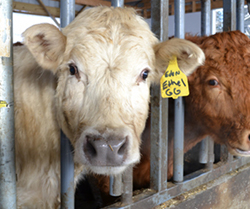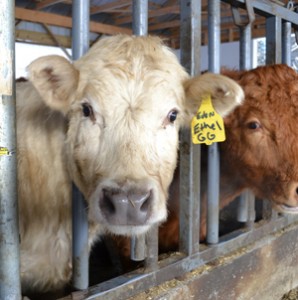

copyright the Chronicle February 5, 2014
by Bethany M. Dunbar
The federal farm bill passed the U.S. Senate Tuesday, 68 to 32.
The bill includes a key provision for dairy farmers, called a Margin Protection Plan. Similar to crop insurance, it allows farmers to buy into a plan that will protect their prices should the federal milk price normally paid to them drop, or should their production costs rise dramatically.
A statement from U.S. Senator Patrick Leahy says the hoped-for supply management plan that was in the Senate version of the bill was stripped out. But as a member of the conference committee, Senator Leahy was able to make a change that will help smaller dairy farmers more than large corporate farms.
Small farms will be able to enroll at lower rates and get higher protection, the statement explains.
Congressman Peter Welch was able to bring the news to the Vermont Farm Show at the Champlain Valley Exposition grounds on Thursday, January 30, that the farm bill had finally passed in the House.
“We have got a farm bill,” said Congressman Welch. “I’ll let you in on a secret. Congress does not act with the efficiency of your farms.”
The current bill has been debated for two years. Mr. Welch said that while the bill, as it passed the House, was not perfect, it was much better than it might have been.
“It finally gives some stability to what our dairy price is going to be.”
Senator Leahy’s statement says the bill, which covers five years of farm and rural programs, will save taxpayers $23-billion by eliminating some programs, including farm subsidies, and changing others. It will also cut assistance to people who need help with food, but those cuts are much less than the House wanted to cut. Senator Leahy’s statement says the House wanted to cut $40-billion from food programs.
“While I am deeply disappointed that the final bill contains any cuts to the Supplemental Nutrition Assistance Program, the conferees rejected the deepest cuts to the hunger safety net and the most harmful new conditions advocated by an extreme majority in the House, both of which would have undermined the very reason we offer food assistance.”
The bill continues a key rural economic development program that has helped many businesses and brought millions of dollars into the Northeast Kingdom, called the REAP Zone. Another economic development program for Vermont’s six northernmost counties, called the Northern Border Regional Commission, was also funded for five years.
Key environmental programs are continued as well, including one designed to help clean up waterways.
Called the Environmental Quality Incentives Program (EQIP), this program was started in 1996 and will be funded at $1.6-billion a year for the next five years.
The farm bill also includes an organic certification cost-share program and funds for research on organics and specialty crops, including hemp.
“This is the seventh farm bill on which I have been a conferee, and none has been more difficult than this one,” says Senator Leahy’s statement. “We passed it not once but twice before in the Senate, and it kept coming off the rails in the House in a series of missteps that bring to mind the Perils of Pauline. These delays have burdened farmers and others with needless uncertainty. Now those burdens will finally be lifted.”
Those burdens are lifted at a time when dairy economist Bob Wellington of Agri-Mark says U.S. dairy prices are likely to be good for the coming year, due to exports.
“The dairy community and the dairy economy is alive and very, very well,” said Vermont’s Agriculture Secretary Chuck Ross during the Vermont Farm Show dairy banquet. He said things look a lot brighter than they did ten days before that as the conferees struggled to reach a compromise.
“We’re not big, but we’re powerful in Washington, and he’s one of the reasons,” said Mr. Ross as he introduced Congressman Peter Welch.
contact Bethany M. Dunbar at [email protected].
For more free articles from the Chronicle like this one, see our Editor’s Picks pages. For all the Chronicle’s stories, pick up a print copy or subscribe, either for print or digital editions.







